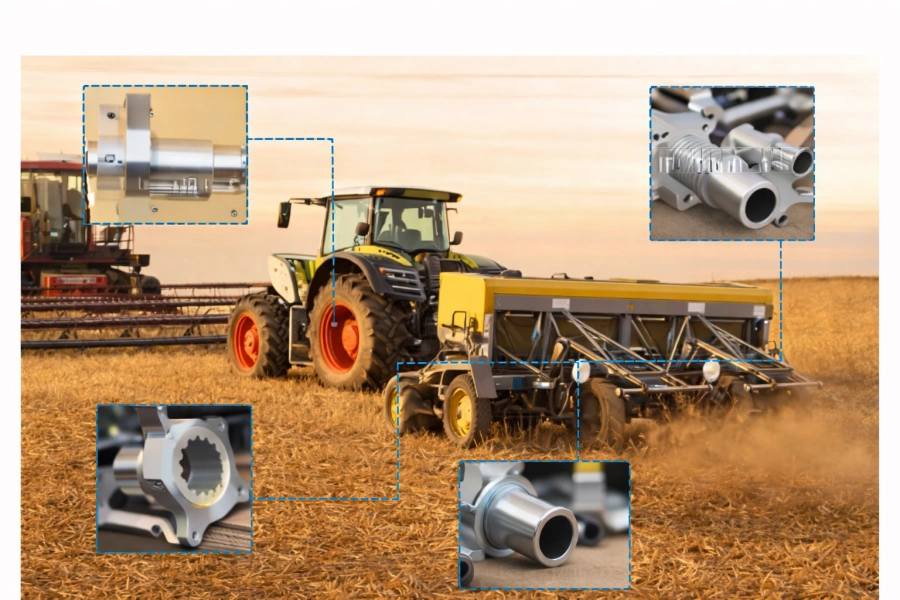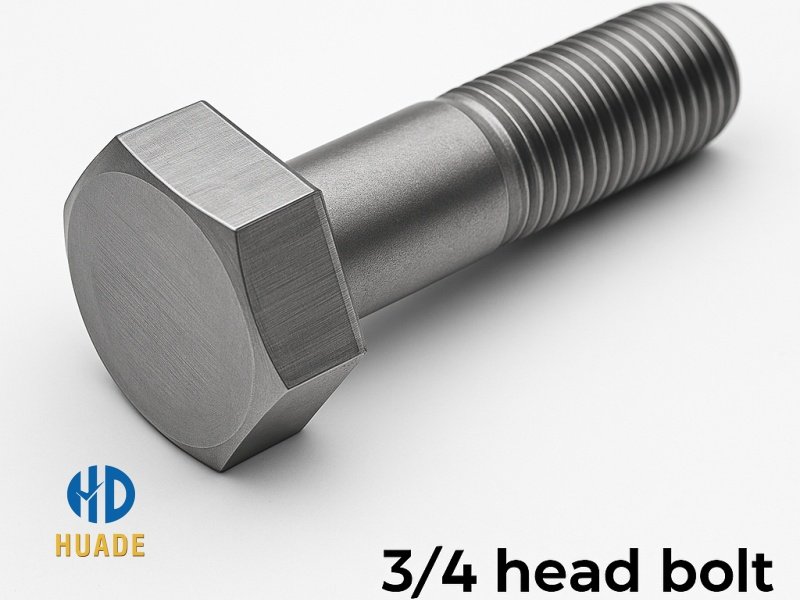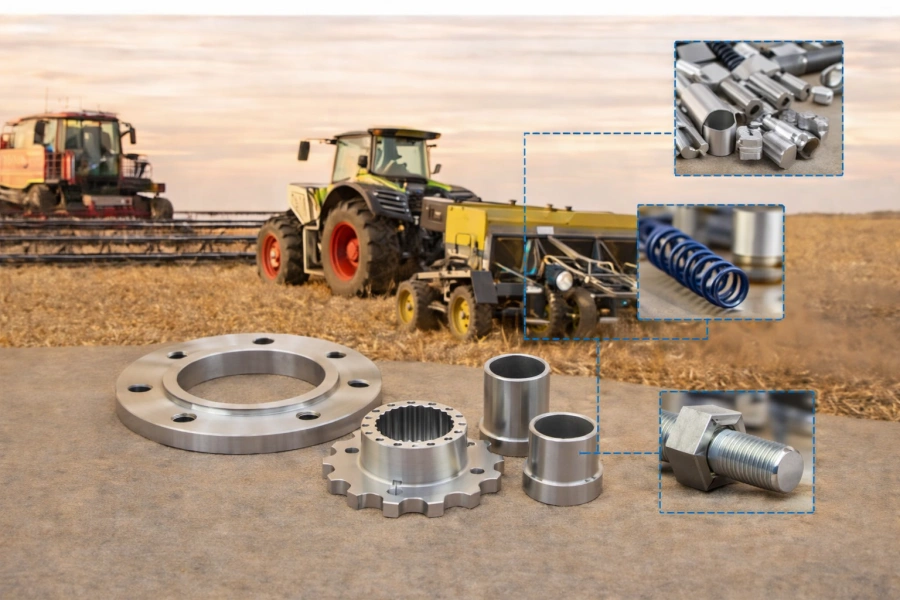Agriculture is an industry that depends on reliable machinery. Whether it’s a tractor, harvester, or planting system, every component must withstand heavy use and demanding environments. Agricultural machined components produced by CNC machining provide the precision, durability, and cost-effectiveness required to keep farming equipment running smoothly.
In this article, we will explore the role of CNC machining in agricultural machinery, discuss materials such as AISI 1074 carbon springs, highlight the importance of fasteners like the U bolt sizes and 3/4 head bolt size, and explain why CNC machining is the best solution for manufacturing parts in the farming industry.

Detailed view of CNC machined parts applied to agricultural machinery.
Key Agricultural Machined Components
Farming equipment requires a wide range of machined parts, including:
- Drive shafts and axles for power transmission.
- Bushings and bearings to reduce friction.
- Gear systems for reliable torque transfer.
- Fasteners and bolts to ensure structural stability.
- Springs that absorb shock and maintain performance.
CNC machining ensures these parts achieve tight tolerances, often within ±0.01mm, making them suitable for high-stress agricultural applications.
Material Selection: The Role of AISI 1074 Carbon Springs
Among all materials used in farming equipment, springs play a critical role. One of the most common materials is AISI 1074 carbon steel, widely used to produce durable and resilient springs.
Why AISI 1074 carbon springs are ideal for agriculture:
- High strength and fatigue resistance: Perfect for heavy-duty equipment like seeders or tillers.
- Excellent wear resistance: Withstands continuous load cycles without losing performance.
- Cost-effective material: Delivers durability without significantly increasing manufacturing costs.
For example, AISI 1074 carbon springs are widely used in seed drills to maintain consistent depth, in harrows as resilient tines, and in combine harvesters to absorb vibration. Their ability to withstand repeated stress cycles makes them an essential material for farming applications.
By using CNC machining, these springs can be produced with precision forming, consistent dimensions, and heat treatment options to further enhance mechanical properties.
Standard Fasteners: The Example of 3/4 Head Bolt Size
No piece of agricultural equipment is complete without reliable fasteners. From assembling frames to securing rotating parts, bolts are essential. One frequently referenced standard size is the 3/4 head bolt size.
Why 3/4 head bolt size matters in farming machinery:
- Strength for heavy loads: Large enough to handle structural stress in tractors and combines.
- Compatibility with industry standards: Ensures easy replacement and maintenance in global markets.
- CNC precision manufacturing: Guarantees accurate thread cutting, uniform head dimensions, and consistent performance under vibration.

A common example is the use of 3/4 head bolts in tractor chassis frames, harvester platforms, and plow assemblies, where secure fastening under vibration and heavy load is critical. These bolts ensure machinery remains stable and safe, even during intensive field operations.
When fasteners are poorly manufactured, equipment may loosen, break, or fail prematurely. CNC machining eliminates these risks by ensuring every bolt meets strict dimensional tolerances.
Why CNC Machining Is Essential for Agricultural Components
CNC machining offers multiple advantages that make it the preferred method for producing agricultural machined components:
- Precision: Achieving tolerances as tight as ±0.01mm, ensuring parts fit perfectly.
- Durability: High-quality finishes reduce wear and extend part life.
- Flexibility: Supports both low-volume prototyping and large-scale production.
- Material diversity: Compatible with carbon steel, stainless steel, aluminum, and engineering plastics.
- Faster turnaround: CNC systems allow rapid prototyping in as little as 2–3 days, reducing downtime for farmers.
These advantages ensure that every component, from AISI 1074 carbon springs to 3/4 head bolts, is manufactured to meet the toughest agricultural standards.
Real-World Applications in Farming Equipment
- Tractors: Machined shafts, gears, and fasteners ensure efficient power transmission.
- Harvesters: Precision-engineered springs and blades increase reliability during long harvesting cycles.
- Planters and seeders: Durable bolts and frames hold up under repetitive use.
- Irrigation systems: Custom CNC machined connectors and fittings provide leak-free performance.
By integrating CNC machining, manufacturers can deliver agricultural parts that farmers can trust season after season.

CNC machined flange, gear and bushings used in modern agricultural machinery.
Future Trends in Agricultural Machined Components
The agricultural industry continues to evolve, driven by the need for higher efficiency and sustainability. As farming equipment becomes more advanced, the demand for agricultural machined components with greater precision and improved materials also increases.
One trend is the integration of lightweight alloys and composites into traditional equipment. By replacing heavy cast parts with CNC machined aluminum or composite components, manufacturers can reduce fuel consumption while maintaining strength. Another trend is the shift toward smart farming systems, where machined connectors, housings, and brackets must fit electronic sensors and IoT devices that improve productivity.
In addition, farmers are increasingly looking for customized components. Not every piece of equipment uses the same bolt sizes or spring dimensions, which is why CNC machining is valuable—it allows quick customization of parts like a 3/4 head bolt size or a specially designed AISI 1074 carbon spring without requiring high-volume production.
Quality Assurance in CNC Machining for Agriculture
Agricultural machinery often works in harsh environments—dust, mud, high humidity, and heavy loads. That means parts must pass strict quality inspections before being installed.
At our factory, every agricultural machined component undergoes:
- Dimensional inspection using CMM (Coordinate Measuring Machines).
- Material testing to ensure carbon steel or alloy steel meets strength requirements.
- Surface treatment checks, including plating, anodizing, or painting, to ensure long-term corrosion resistance.
For example, a 3/4 head bolt size manufactured without precise threading may lead to equipment breakdown in the field. By combining advanced CNC machining with thorough quality control, we make sure every fastener and spring performs reliably throughout its service life.
Partnering With a Reliable CNC Machining Supplier
For OEMs and equipment manufacturers in the farming industry, partnering with the right machining supplier is critical. A trusted CNC machining partner provides more than just parts—they deliver:
- Engineering support for part design and optimization.
- Rapid prototyping in 2–3 days to test new agricultural innovations.
- Flexible order quantities, from single-piece samples to full-scale production.
- Logistics support, ensuring on-time delivery worldwide.
Whether it’s AISI 1074 carbon springs for a seeder, precision bushings for a tractor, or bolts in the 3/4 head bolt size for a combine harvester, we help agricultural equipment makers secure reliable, long-lasting components.
Key Takeaways for Agricultural CNC Parts
The farming industry depends on machinery that performs flawlessly in demanding environments. High-quality agricultural machined components, whether they are AISI 1074 carbon springs or bolts like the 3/4 head bolt size, are essential for reliable equipment. CNC machining delivers the accuracy, consistency, and material versatility required to meet these needs.
The future of agriculture depends on stronger, lighter, and smarter equipment. CNC machining is uniquely positioned to meet these challenges by delivering agricultural machined components with unmatched accuracy, material versatility, and scalability. From standard fasteners to specialized springs, every detail counts in ensuring farming equipment performs at its best.
📩 Contact us at sales@hdproto.com to request a free quote for your agricultural CNC parts today.
